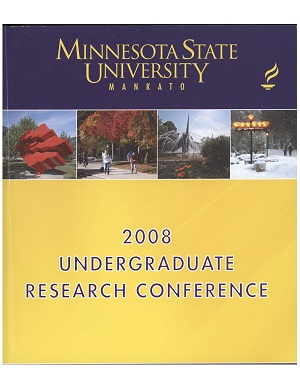Future Teacher's Perceptions of Treatment for Challenging Behavior in Autism
Location
CSU 255
Start Date
22-4-2008 10:30 AM
End Date
22-4-2008 12:00 PM
Student's Major
Special Education
Student's College
Education
Mentor's Name
Ockjean Kim
Mentor's Department
Special Education
Mentor's College
Education
Description
With the dramatic increase in incidence of autism nationwide, it is highly likely that pre-service teachers will have one or more students with autism who exhibit serious challenging behaviors in their future classrooms. The purpose of thi_s study is to find out future teachers' opinions about various treatment procedures proposed for dealing with difficult behaviors often observed in autism. The information obtained will be used to educate teacher educators in their development of teaching future teachers how to educate children with autism. Participants were pre-service teachers from Minnesota State University, Mankato, attending special education and elementary education classes. Participants completed the Treatment Evaluation Inventory, a questionnaire consisting of three case studies, each followed by three different interventions. Following each intervention were nine statements for pre-service teachers to rate their perceptions. I investigated whether there were differences in treatment acceptability across different majors (special education vs. general education) and across different behavior problems (aggressive, self-injurious, vs. disruptive). Preliminary examinations of responses from special education student teachers indicated that a segment of pre-service special education teachers reject the use of aversive interventions under any circumstances, while some may be open to the conditional use of aversive interventions.
Future Teacher's Perceptions of Treatment for Challenging Behavior in Autism
CSU 255
With the dramatic increase in incidence of autism nationwide, it is highly likely that pre-service teachers will have one or more students with autism who exhibit serious challenging behaviors in their future classrooms. The purpose of thi_s study is to find out future teachers' opinions about various treatment procedures proposed for dealing with difficult behaviors often observed in autism. The information obtained will be used to educate teacher educators in their development of teaching future teachers how to educate children with autism. Participants were pre-service teachers from Minnesota State University, Mankato, attending special education and elementary education classes. Participants completed the Treatment Evaluation Inventory, a questionnaire consisting of three case studies, each followed by three different interventions. Following each intervention were nine statements for pre-service teachers to rate their perceptions. I investigated whether there were differences in treatment acceptability across different majors (special education vs. general education) and across different behavior problems (aggressive, self-injurious, vs. disruptive). Preliminary examinations of responses from special education student teachers indicated that a segment of pre-service special education teachers reject the use of aversive interventions under any circumstances, while some may be open to the conditional use of aversive interventions.
Recommended Citation
Lee, Renee. "Future Teacher's Perceptions of Treatment for Challenging Behavior in Autism." Undergraduate Research Symposium, Mankato, MN, April 22, 2008.
https://cornerstone.lib.mnsu.edu/urs/2008/oral-session-13/3




